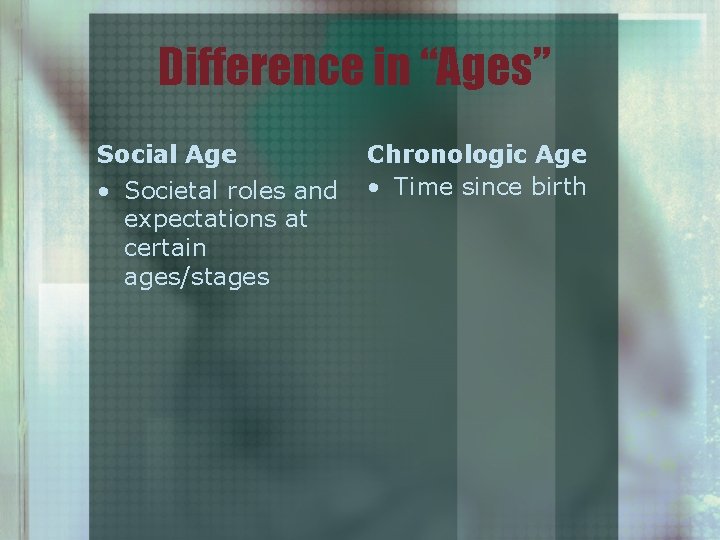Is Age Just A Number? Exploring The Social And Biological Aspects

Table of Contents
The Social Construction of Age
Our understanding of age isn't solely determined by the number of years we've lived; it's heavily influenced by societal norms and expectations. The social construction of age significantly impacts how we view ourselves and how others perceive us throughout our lifespan.
Societal Expectations and Ageism
Ageism, the stereotyping and discrimination against individuals based on their age, pervades many aspects of life. These age stereotypes significantly impact opportunities and experiences.
- Employment: Older workers often face age discrimination, with biases against hiring or promoting them, despite their valuable experience and skills. This leads to early retirement and financial insecurity for many.
- Healthcare: Older adults may experience ageist attitudes from healthcare professionals, leading to inadequate care or dismissal of their concerns. Assumptions about their frailty or cognitive decline can hinder effective treatment.
- Social Interactions: Media often portrays aging negatively, reinforcing stereotypes of decline and irrelevance. This can lead to social isolation and a diminished sense of self-worth for older adults. Conversely, younger individuals may face pressure to conform to unrealistic ideals of youthfulness and beauty.
Age and Identity
Age profoundly influences our self-perception and identity formation. Different life stages are associated with specific social roles and expectations, shaping our sense of self.
- Youth: This stage is often associated with exploration, identity formation, and the pursuit of education and career goals. Social pressure to conform to specific appearance standards is intense.
- Adulthood: Marked by career establishment, family formation, and increased responsibilities. Identity is often defined by professional achievements and family roles.
- Old Age: Societal perceptions of this stage can significantly impact self-esteem. Positive representations emphasize wisdom, experience, and contributions to society, while negative representations focus on decline and dependency. Age identity is crucial to navigating this life stage.
The Biological Reality of Aging
While the social construction of age shapes our perceptions, the biological process of aging is an undeniable reality. It's characterized by a gradual decline in physiological functions.
Physiological Changes with Age
Biological aging involves a multitude of changes at the cellular and systemic levels. These changes, while inevitable, vary significantly based on genetics and lifestyle choices.
- Decreased Muscle Mass (Sarcopenia): Loss of muscle mass and strength leads to reduced physical function and increased frailty.
- Bone Density Loss (Osteoporosis): Weakening of bones increases the risk of fractures and mobility issues.
- Metabolic Changes: Changes in metabolism affect weight management, energy levels, and overall health.
- Cellular Aging: Accumulation of cellular damage over time contributes to the aging process.
The Role of Genetics and Lifestyle
Genetics play a significant role in determining our lifespan and susceptibility to age-related diseases. However, lifestyle factors significantly influence the rate of aging and overall health.
- Diet: A balanced, nutritious diet rich in fruits, vegetables, and whole grains supports healthy aging and reduces the risk of age-related diseases.
- Exercise: Regular physical activity helps maintain muscle mass, bone density, and cardiovascular health, contributing to healthy aging.
- Stress Management: Chronic stress accelerates aging and increases the risk of various health problems. Effective stress management techniques are crucial for healthy aging.
- Preventative Measures: Regular health check-ups, vaccinations, and screenings for age-related diseases are essential for maintaining health and well-being throughout life.
Conclusion
In conclusion, while the biological process of aging involves inevitable physiological changes, our social perception and experience of age are far more malleable. We cannot escape the biological realities of aging, but we can actively shape our experience of it by challenging ageist attitudes and prioritizing a healthy lifestyle. Let's challenge the notion that age is just a number and instead, strive for a society that values the contributions of individuals at all stages of life, promoting healthy aging and combating age discrimination. By understanding both the social and biological aspects of aging, we can create a more inclusive and supportive environment for all.

Featured Posts
-
 Louisville Postal Service Delays Union Leader Offers Update
Apr 30, 2025
Louisville Postal Service Delays Union Leader Offers Update
Apr 30, 2025 -
 Lich Thi Dau Vong Chung Ket Thaco Cup 2025 Thoi Gian Va Noi Xem Truc Tiep
Apr 30, 2025
Lich Thi Dau Vong Chung Ket Thaco Cup 2025 Thoi Gian Va Noi Xem Truc Tiep
Apr 30, 2025 -
 Angels Season Starts With Injury And Pitching Woes
Apr 30, 2025
Angels Season Starts With Injury And Pitching Woes
Apr 30, 2025 -
 Ket Qua Goi Thau Cap Nuoc Gia Dinh Tam Hop Chien Thang Truoc 6 Doi Thu
Apr 30, 2025
Ket Qua Goi Thau Cap Nuoc Gia Dinh Tam Hop Chien Thang Truoc 6 Doi Thu
Apr 30, 2025 -
 App De Ia Da Meta Desafia O Chat Gpt
Apr 30, 2025
App De Ia Da Meta Desafia O Chat Gpt
Apr 30, 2025
